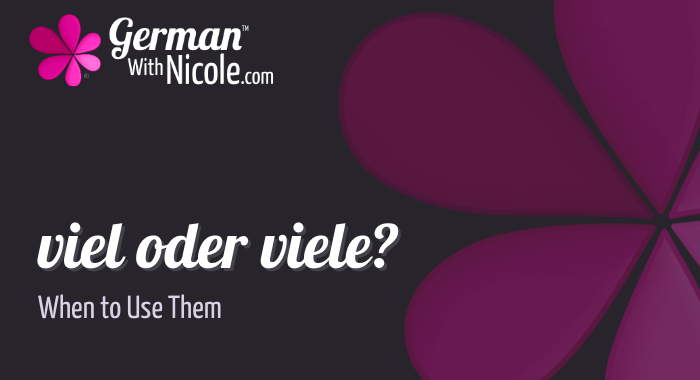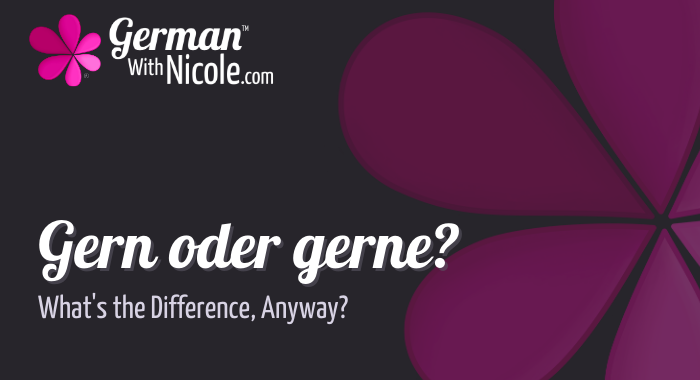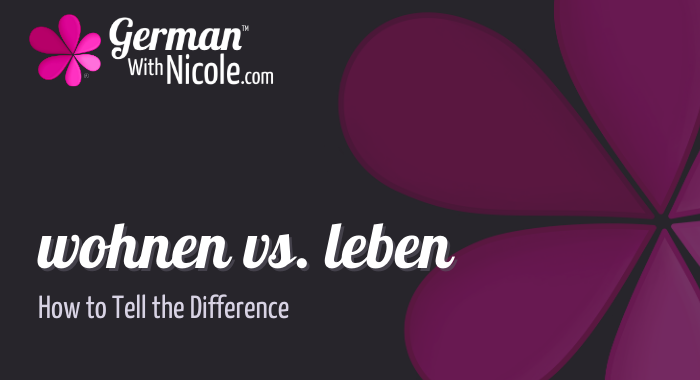Good ol'-fashioned RSS Feed
das Blog
Deutsch lernen
Viel oder viele?
"Viel" oder "Viele"? Gute Frage!
It depends on whether or not you're speaking about something that can be counted. For example:
viel Zeit - lots of time. Time in general cannot be counted. (You can count hours, but not time itself.)
viele Menschen - many people. People can be counted.
Erfolg (success) is another example of something that cannot be counted. Certain things, yes, like finishing a degree or obtaining your driver's license, can be counted, sure, however they are very specific eve…
"Gern" oder "gerne"?
"Das mache ich gern."
"Ich gehe gern schwimmen."
oder
"Das mache ich gerne."
"Ich gehe gerne schwimmen."
Was ist eigentlich der Unterschied?! Sagt man eigentlich "gern" oder "gerne"? Gute Frage!
Man kann entweder "gern" oder "gerne" sagen--es macht praktisch keinen Unterschied. Je nach dem, was Sie sagen wollen, können Sie frei wählen, ob Sie "gern" oder "gerne" sagen möchten.
![]()
You can use either "gern" or "gerne" in German, it doesn't really make a difference. Depending on the sente…
Wiederholen Sie, bitte!
5 Ways to Re-Use Your German & Learn More in the Process
There is one key ingredient to students who learn the most in their German lessons: they repeat, repeat, repeat, repeat, repeat.
My first German teacher was (and surely still is) an excellent instructor. She told me if I wanted to learn a new word in German, I'd have to use it 28 times.
28 times!! That's a lot of repetition. (If that's an average, sometimes it goes faster--say 20 repetitions, and sometimes it takes longer, say 40 repet…
wohnen vs. leben
IKEA Germany advertises with a catchy slogan:
Wohnst du noch, oder lebst du schon?
Are you still living, or are you already living?
Sehr lustig.
This works in German since wohnen ≠ leben. But the difference is significant. Here's how to tell the difference between wohnen and leben and which one to use when.
wohnen
"wohnen" is used for short-term situations.
"Ich wohne bei meinen Eltern" ...because I'm at home for the summer.
"Ich wohne bei einer Freundin" ...because I'm waiting for m…
kennen vs. wissen
"Kennen" is not the same as "wissen" and it can be very confusing trying to tell the two apart.
Here you will learn what "kennen" means, what "wissen" means, and finally how to tell the difference.
There are example sentences, too, and I highly recommend you grab your German notebook and write them down so you can refer back to them later.
kennen
Ich kenne... is for things you can get to know. You might not have always known your German friend Marius, however you got to know him once, which …
It's OK to Cry When You Don't Understand: 3 Ways to Bust Through
Students of foreign languages sometimes get upset when they get frustrated. They get really frustrated and really upset because what they want most is to speak a foreign language, they've done their homework, they've studied, and somehow the pieces just don't fit together or the pieces they want don't come together when they speak.
It's a hard-core experience.
Some students think I learned German easily because I learned it quickly--it was not easy and my German skills were and are hard-won with…
How to Create the Weil Sentence Structure
The Weil sentence structure is a tough one for English speakers. We say "because I said so," but the Germans say "weil ich es gesagt habe," or (translated directly) "Because I so said!"
It's the exact opposite way in German. The verbs go all the way at the end.
Although Germans are, at least in the media, losing this construction faster than the ice caps are melting, there is one almost-guaranteed compliment you will receive when you can say this properly. A German will hear it and say to you,…
How to Pronounce the "Ich-Laut" in German
Use this Instructional Video to Learn How to Pronounce the "Ich-Laut" in German!
The Ich-Laut can be tough for English speakers to pronounce because it's not a part of English.
...or is it?
Ladies and Gentlemen, we *do* have the Ich-Laut in English--it's hidden!
In this video on how to pronounce the Ich-Laut, I show you where to find that hidden "ch" sound in English and then I guide you through a couple of exercises to help you pronounce this sound in German.
The most important factor is t…
Categories
- A1 (69)
- A2 (54)
- B1 (45)
- B2 (23)
- C1 (21)
- Deutsch lernen (78)
- Einkaufen (15)
- Essen (11)
- Grammatik (24)
- Hören (13)
- Landeskunde und Kultur (48)
- Lesen (11)
- Musik (5)
- Nachrichten (4)
- Podcast (55)
- Pronunciation (3)
- Schreiben (3)
- Schwäbisch (4)
- Spiele und Spaß (Games and Fun) (12)
- Sprechen (12)
- Vokabeln (38)
- Video (12)
Would you like to hear about future German classes with Frau Warner?
With the E-Post, you'll receive information on German class registration and goings-on in German classes, all written by Frau Warner. You'll receive an email on Tuesdays, plus an extra email or two when class registration opens or there's something new.
If you use Gmail: please check your "promotions" folder.






